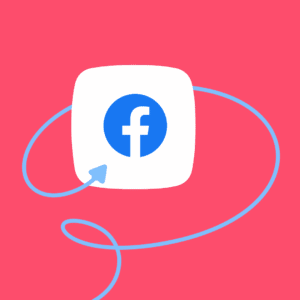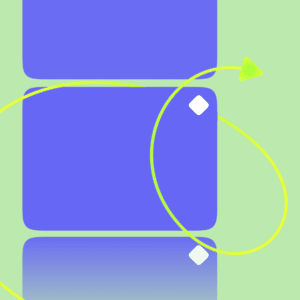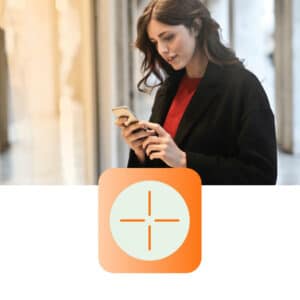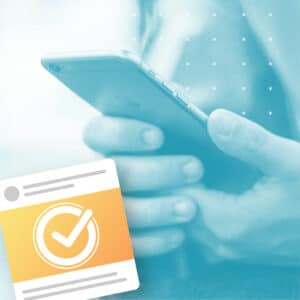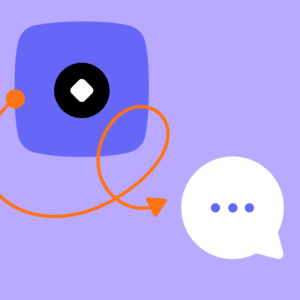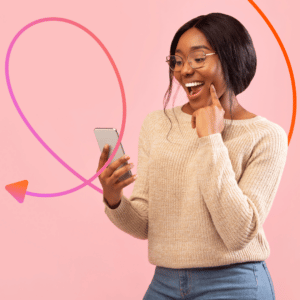How to Send Facebook Messenger Broadcasts on ManyChat (Best Practice and Setup)
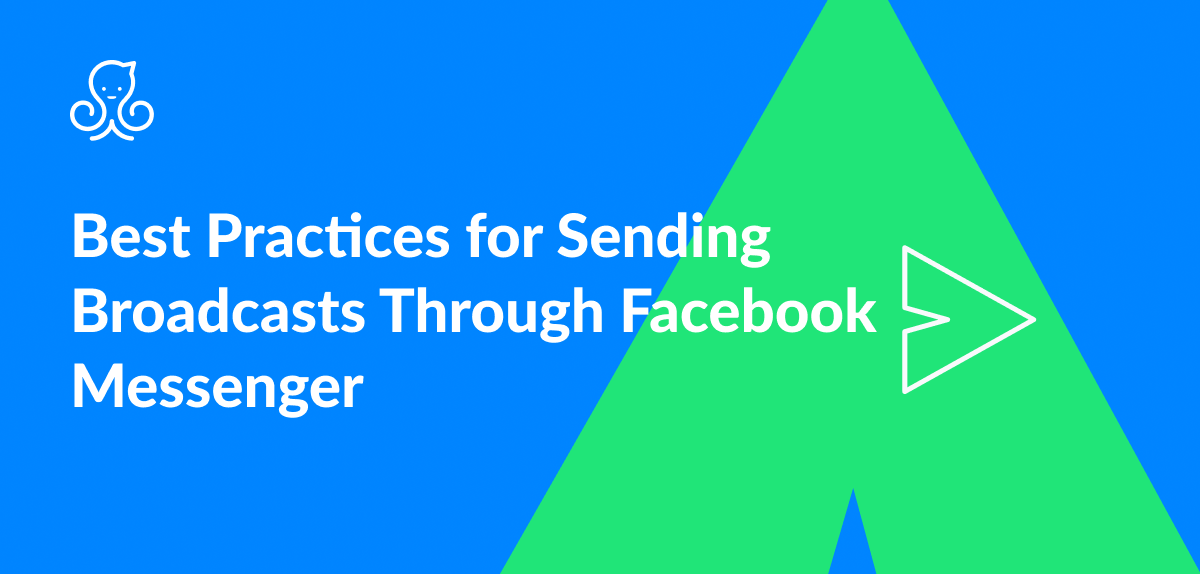
Escrito por Andrey Lipkovskiy
junho 14, 2019
Facebook chatbots have exploded, and for good reason.
They enable you to create interactive messages that engage your audience where they hang out.
But because Messenger Marketing is so very new, many companies are a little uncertain about the best way to send out messages…
Should they just duplicate what they’re doing on email?
Should they send lots of promotional messages? Or avoid promotional messages?
Just what exactly are the best practices for sending Messenger broadcasts?
As one of the world’s leading providers of Facebook Messenger Marketing software, we’re in a unique position to be able to see what’s happening out there—what kind of broadcasts people are sending, which ones are working, and which ones aren’t.
And in this post we’re taking all that experience and expertise to help you create better broadcast messages.
Follow these broadcasting tips and strategies and you’ll be on your way to generating sky-high engagement and sales through Facebook Messenger.
Why Facebook Messenger Broadcasting is So Powerful
So the first thing you might be wondering is, why should you send broadcasts through Facebook Messenger at all? Can’t you just send emails like you’ve been doing for years now?
Well, sure. You can…
But you would be missing out on some big-time results like this:
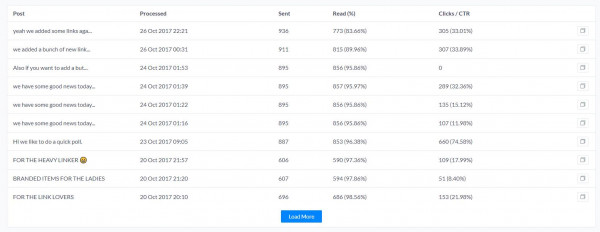
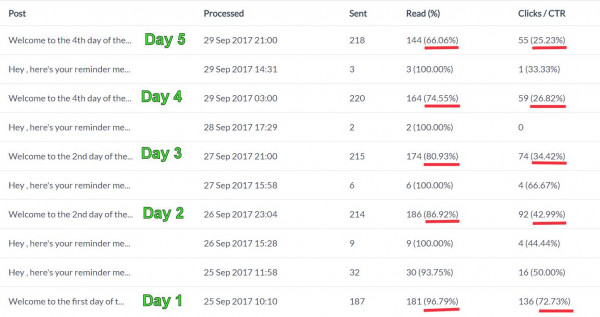
If you’re an email marketer, you might need to pick your jaw up off the floor.
Yes, those are open rates of 66.06%-98.56% and click-through rates of 8.40%-72.73%.
No, you aren’t hallucinating.
Yes, those numbers are fairly typical of what many marketers are seeing.
Yes, those numbers blow email marketing metrics out of the water—as you can see here:
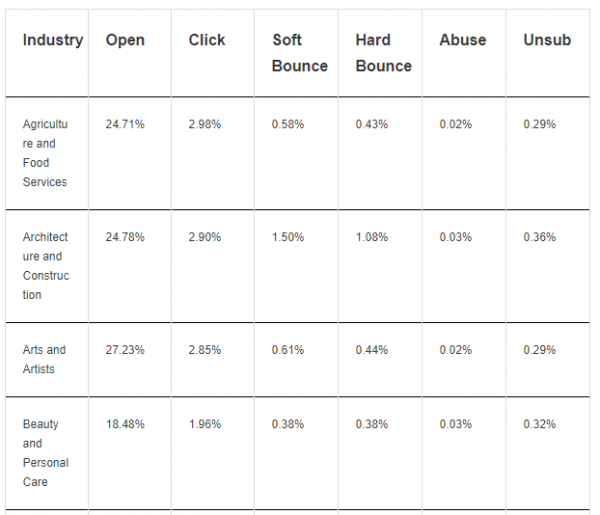
Source: https://mailchimp.com/resources/research/email-marketing-benchmarks/
So what do you think? Are you convinced yet?
No?
Then let me throw a few more benefits at you.
With Facebook Messenger Marketing, because everything is tied to individual Facebook accounts, you don’t have to worry about your messages bouncing.
You also don’t have to worry about people giving you a “bad” Facebook account (the way they use bogus email addresses on your opt-in forms).
Also, Facebook Messenger inboxes aren’t as flooded as email inboxes…. And most people are only using Facebook Messenger to interact with family and friends.
This means that they actually USE Facebook Messenger and that they probably have push notifications enabled on their phone for when they receive a new message.
These are just a few of the reasons why marketers, entrepreneurs, and business owners love using Facebook Messenger Marketing.
And a big part of getting the most out of Messenger Marketing is the strategic use of broadcasts.
What are Facebook Messenger Broadcast Messages?
If you’re familiar with email marketing, then you probably already get the idea of broadcasting. If not, let me explain it this way:
A broadcast is a one-off message you send to people on your Messenger list.
Many marketers tend to focus on the automated side of Messenger Marketing. And it’s easy to see why: people love the idea of creating “set it and forget it” chatbots that will run on autopilot.
But not everything can be automated. Sometimes you need to send an ad hoc message to let your subscribers know about an update, a piece of news, to ask a question or send a survey, or even just wish your list a Merry Christmas.
And if you’re a ManyChat user, you can also use broadcasts to segment your users into more specific sequences. For example, say you send this broadcast to your subscribers:
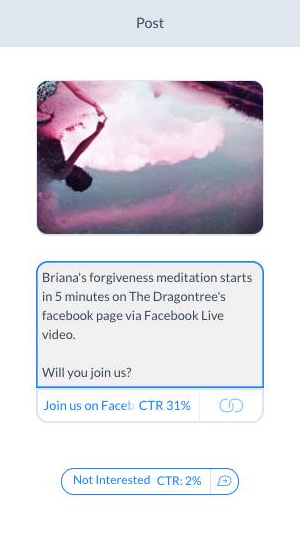
You can tag everyone who clicks “Join us on Facebook” with a tag such as “likes_meditation.” You can then send those users into a specific meditation-focused Messenger sequence that gives them more of the content they’re interested in.
3 Types of Broadcast Messages on Facebook Messenger
There are three different types of broadcasts you can send on Facebook Messenger, and each type has its own rules and stipulations.
Why did Facebook create these rules?
In short, they want to make sure their users have a positive experience when using Messenger. And part of having a positive experience means NOT being inundated with spammy promotional messages.
So yes, you are limited in how often you can send promotional emails via Facebook Messenger. But keep in mind the benefit of all those rules: when you do send a promotion to your subscribers, they will be more receptive because they aren’t being buried by ads from other marketers.
(Like most of our inboxes are today.)
Here’s a quick overview of the three types of broadcasts along with the rules for each:
Facebook Messenger Broadcast Type #1: Non-Promotional Subscription Messaging
At the time of writing this, there have been a few changes to Facebook’s subscription messaging policy.
To send non-promotional subscription messages, your messages need to fall under one of these three categories:
- News, or keeping subscribers up to date on information in terms of your industry
- Productivity, or helping people manage their personal productivity with certain tasks
- Personal Tracking, or helping people monitor data about themselves such as steps taken, foods eaten, money saved, etc.
You used to be able to send non-promotional broadcasts like the wild wild west. Anytime, anywhere. But now you have to apply for subscription messaging if you believe it’ll benefit your business.
Here’s an example of a subscription broadcast—it doesn’t promote anything, but it does a great job of engaging subscribers and helping to build a relationship with them.
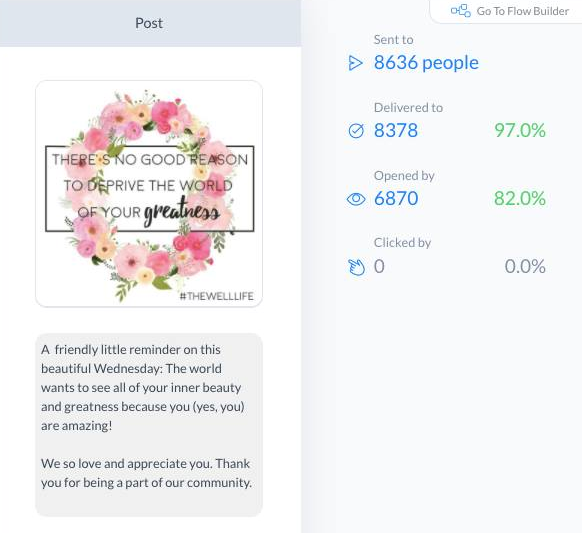
You can also use subscription broadcasts that ask your subscribers questions. Based off of how they answer (which button they click), you can then segment them into a sequence where you COULD ultimately sell them something, if it’s a good fit.
(RELATED: Introducing ManyChat Flow Builder: A Revolutionary Visual Editor for Messenger Marketing)
Here’s a great example of this in action:
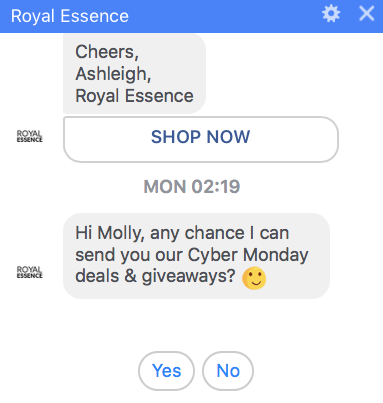
Instead of blasting a promotional message about Cyber Monday, they asked permission to send information about their deals.
Here’s another example of a wonderful subscription broadcast. Tim Ferriss is using this broadcast to promote his live Q&A:
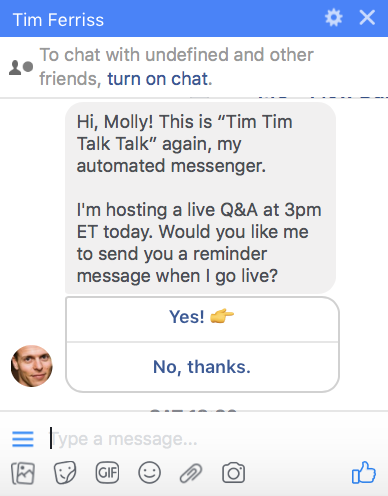
Facebook Messenger Broadcast Type #2: Promotional Broadcasts
This is a broadcast that does contain an ad or other promotional materials. However, you can only send promotional broadcasts to subscribers who’ve interacted with you on Facebook Messenger in the past 24-hours.
Here’s an example of one promotional broadcast that generated $18,400 in sales in just 2½ hours:
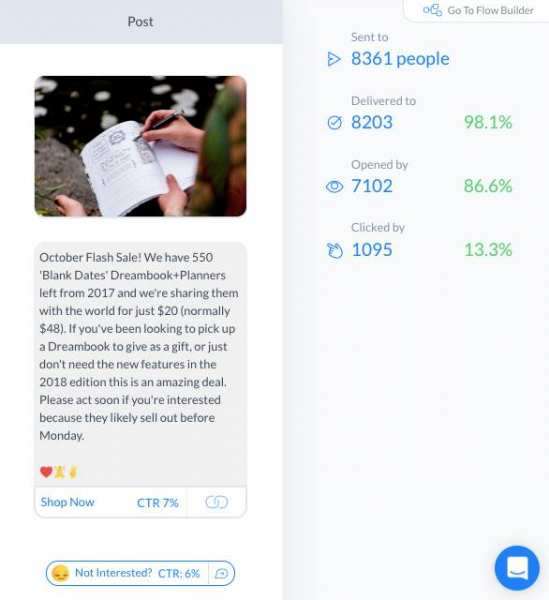
Facebook Messenger Broadcast Type #3: Follow-Up Broadcasts
Once you send someone a Promotional Broadcast, you have the ability to send a follow-up broadcast 24-hours later. Once those 24 hours have passed, you won’t be able to send any more promotional messages until the subscribers interact with your chatbot again.
Follow-up broadcasts give you one last chance to remind your subscribers about your promotion.
How to Send Facebook Messenger Broadcasts on ManyChat
Now that you know what broadcasts are, when to use them, and what the rules are, let’s dive into actually creating your first broadcast message inside of ManyChat.
Create Your Broadcast Message
To get started, click “Broadcasting” and “Broadcasts” in the menu on the left. Then click “+ New Broadcast” in the top right.
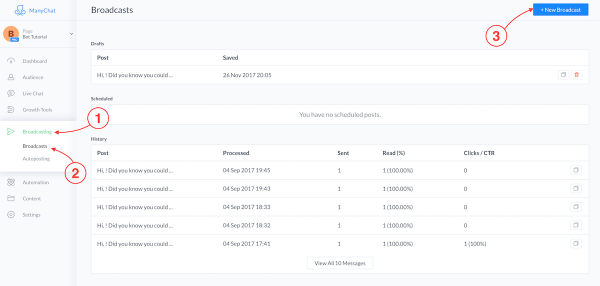
This will take you to the Create Broadcast screen, where you can customize the content in your broadcast.
Keep in mind there are now two ways to build out your content: using the old linear builder, or the new Flow Builder.
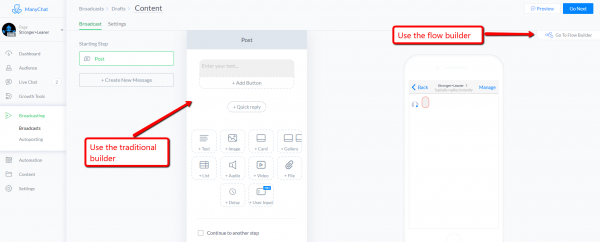
For this example we’ll be using the new Flow Builder.
When you click on the “Go to Flow Builder” button, you’ll see a flow containing just one step—the Starting Step.
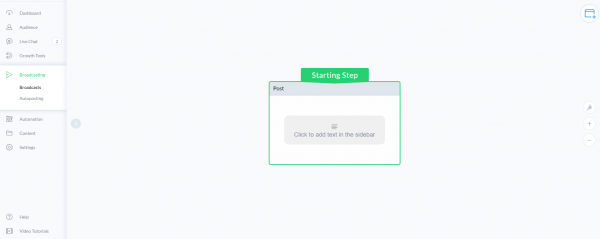
Click on the post to bring up a sidebar where you can add content to the first step.
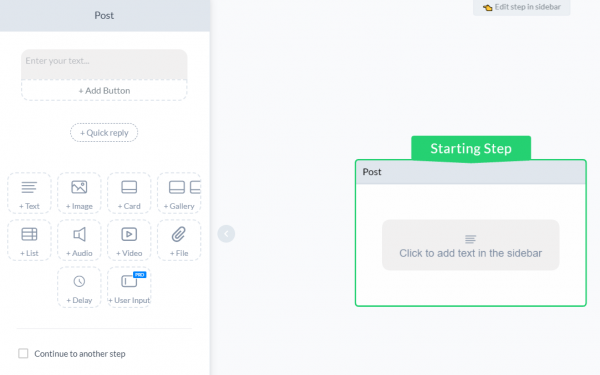
From here, you can add any kind of content you want—text, images, buttons, videos, and so on.
For this example, let’s just add a simple text message with two buttons. Click “+ Text” and type in your message. Then, to add a button, click the “+ Add Button” button underneath:
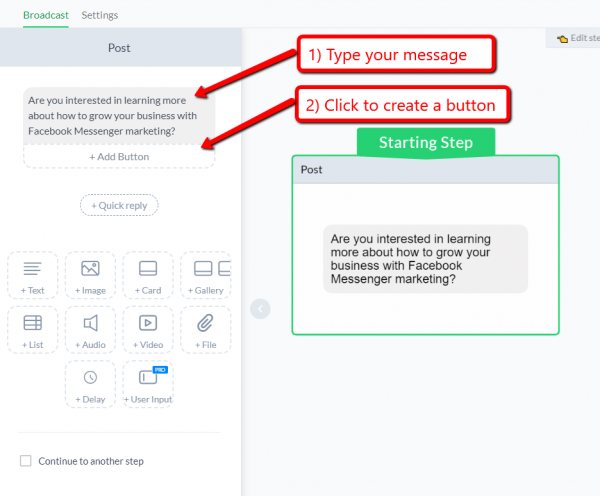
Now you just have to specify the button text and choose what you want the button to do—send a message, perform an action, or send the user to another flow.
In this case, let’s create a “Yes” button that sends the user a message.
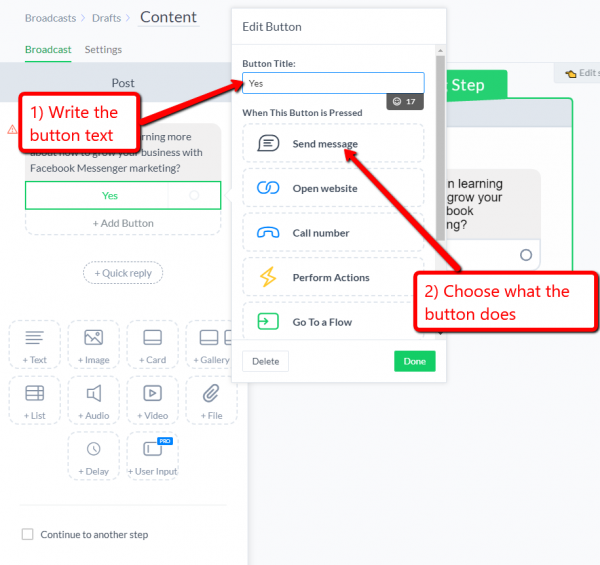
At this point you may notice that a new step appears on the Flow Builder:
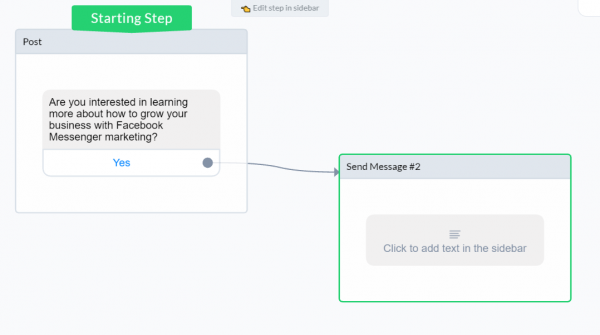
And once again, just click on the new step to edit the message. In this case, we’ll add a button that sends the user to a blog post where they can learn more about Messenger Marketing.
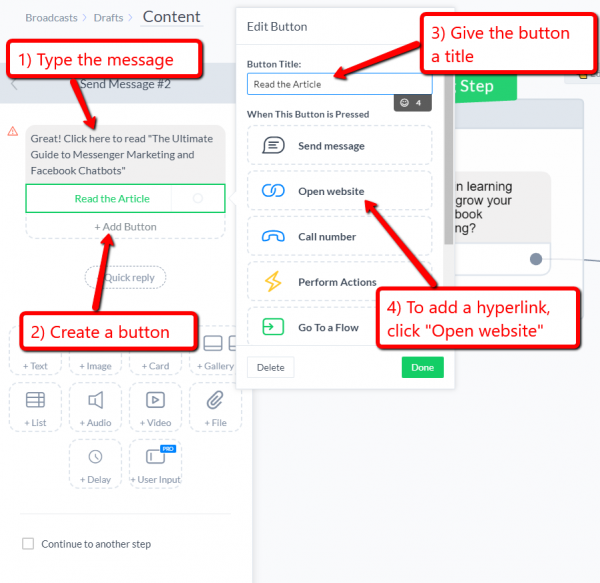
Our broadcast flow now has two steps:
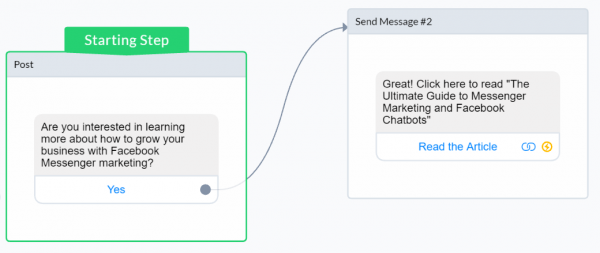
And we can follow those same steps again to add a “No” button, giving us 3 total steps:
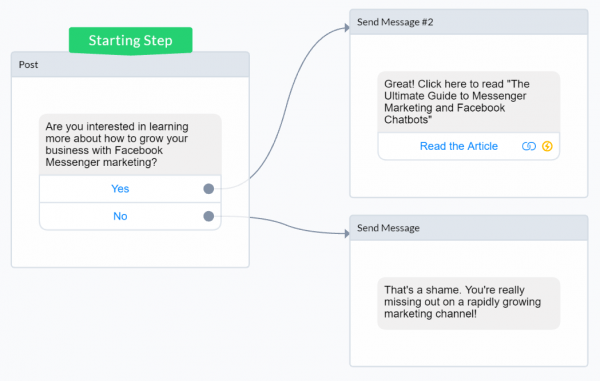
The last thing you’ll want to do is preview your broadcast to make sure it looks the way you want. To do that, just click “Preview” in the upper-right corner.
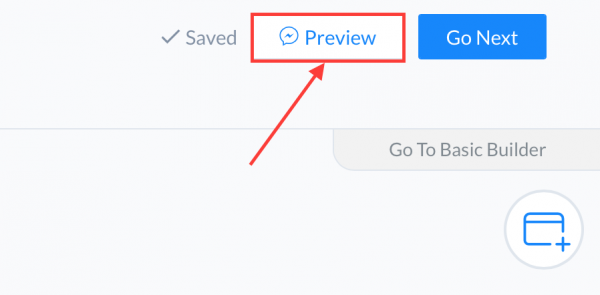
Then if you head to Messenger, you can test out the broadcast yourself. Here’s what our broadcast looks like when I click “Yes”:

And here’s what it looks like when I click “No”:

Perfect! Now that my broadcast content is created, I’m ready to wrap up the settings and send it to my subscribers.
Target & Send Your Broadcast
Next you’ll want to click the “Settings” button at the top of the screen.
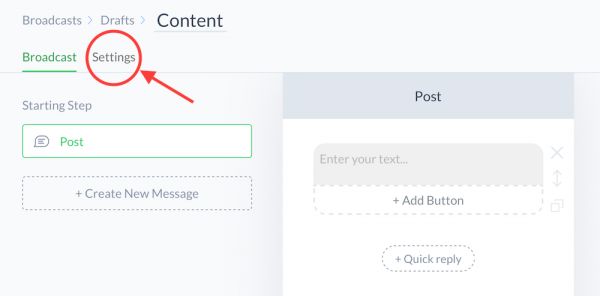
Here is where you can change your message settings, including…
Message Type: We talked about the three message types above. Just click the type of message you want to send.
Targeting: This is where you can determine who receives your broadcast. When you click “+ Condition,” you’ll see a list of targeting options.
You can choose to send your broadcast to users who have been tagged in a previous message, users who have subscribed to a specific sequence, or you can target by demographics.
You can also add multiple conditions to get incredibly focused in your targeting—such as sending a message only to male subscribers who have been tagged as “likes_meditation” and who have not subscribed to your “Thank You For Ordering” sequence. Like so:

Schedule Broadcast: This is pretty self-explanatory. Choose whether you want to send your message immediately or at some point in the future.
Timezone Settings: Here you can choose how to handle broadcast scheduling for users in a different timezone. Do you want everyone to receive your broadcast at once? Or do you want everyone to receive it at 9:00am in their local timezone?
Notification Settings: Here you can choose what kind of notification you want to trigger on your subscribers’ phones. A “Regular Push” notification, for example, will make a sound and display a phone notification. By comparison, a “Silent Push” will display a phone notification without any sound.
When you’re finished with these settings, the last step is to click “Send Now” (or “Schedule Message”) in the top-right:

And that’s all there is to it—you just sent your very first broadcast message using ManyChat!
(RELATED: Facebook Subscription Messaging Updates: Your New Messenger Marketing Strategy)
3 Best Practices for Broadcasting Success
Now that you know how to set up and send a broadcast in ManyChat, here are a few best practices to help you get maximum engagement and results from your Messenger broadcasts.
Broadcasting Best Practice #1: Start Easy
When you’re outlining a Messenger broadcast, you want the very first message to be quick and easy to read and respond to.
Do NOT start out with a big, intimidating block of text. That will only put people off.
Remember that your goal with the very first message should be to get your subscribers interested and engaged.
Here’s an example of a broadcast that starts with a short, easy-to-read teaser message followed by a single button.
The result? A 55% CTR.
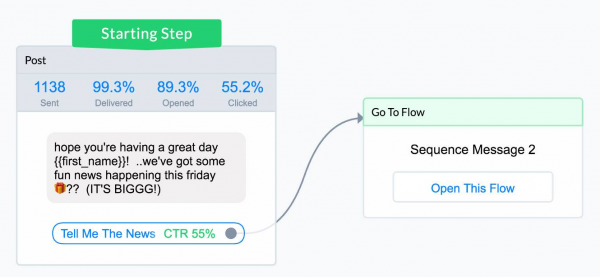
Broadcasting Best Practice #2: Give Options
Don’t just give subscribers a single path to follow in your broadcast. Instead, give them lots of options to personalize their experience.
Remember that people don’t want to feel like they’re being talked at by your chatbot. They want to feel like they’re interacting with it. Conversing with it.
That’s why people expect Messenger messages to give them options. So give them what they want—lots of buttons with branching logic and personalized responses.
Broadcasting Best Practice #3: Ask Questions
Facebook Messenger isn’t a one-way, one-to-many communication the way email is. It’s a two-way street. It’s conversational.
That’s why it’s best to avoid being super-promotional in Messenger broadcasts. Instead, it’s better to ask questions.
Instead of coming out and saying: “Buy my product!”, you’re better off asking subscribers: “Are you interested in learning about x, y, or z?”
Then you can go into a more detail sequence of personalized messages based on their responses. Eventually you can send them more information about a particular product or promotion based on their needs & interests.
When you follow this strategy with your broadcasts, you’ll end up building more of a relationship with your audience. They’ll come to know and trust you, because you didn’t just ram a single product down their throats—you listened to them.
Cool, huh?
(READ NEXT: [Zapier + ManyChat] 4 Ways to Integrate ManyChat into Your Business)
Take your Messenger Marketing to the next level
Facebook Messenger broadcasts can help you reach targeted people quickly and efficiently. When you combine subscription, promotional, and follow-up broadcasts, you can create a Messenger Marketing strategy that drives revenue for your company.
It’s easy to get started. Sign up for your free ManyChat account and start growing your audience today.

